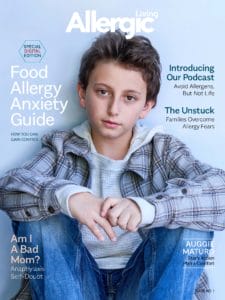From previous articles Allergic Living has published, I knew the stress of managing food allergies was exacting a big toll on the food allergy community. But it was jolting nonetheless to see the outpouring of raw emotion that followed a simple request.
On our social media I asked: “If you feel stuck in food allergy stress, tell us your story.” Gina Clowes asked the same on her Allergy Moms Facebook page. The response that we both received was as huge as it was heartbreaking.
We raised this “stuck” question as we began to work on Allergic Living’s Food Allergy Anxiety Guide – which is our first digital magazine. This Guide is an unparalleled exploration into food allergy anxiety: investigating why our community is so susceptible to this mental health burden, explaining how, why and in whom it arises. And, most importantly, reporting on the best strategies to attain a much-improved quality of life.
There’s definitely an issue of finding balance, especially for those who have witnessed or experienced anaphylaxis. So profound, far-reaching and under-recognized is this form of anxiety, that I view it as one of the most urgent topics for our community.
To give you just a glimpse of the scope of the issue, see our sample pages excerpt from the Guide – and read the quotes from those who told us they do “feel stuck in food allergy stress.”
Those comments show a collective, constant stress and sense of isolation. “I fear losing my joy,” one woman said of life as an allergy parent. A recurring theme was the big one – the fear that a child could die of anaphylaxis. While tragedies are fortunately not common, the worst case remains the “what if” that haunts so many food allergy parents.
The purpose of the digital “Food Allergy Anxiety Guide” is to discuss the fears and the “what ifs” with honesty, and begin to understand this phenomenon as its own anxiety disorder.
Statistics bolster the idea of an emerging disorder. In new data from the FARE Patient Registry, about 90 percent of participating allergy clinics reported working with patients and parents suffering food allergy anxiety. Meantime, a recent online survey from the Asthma and Allergy Foundation of America found 75 percent reporting food-related fears.
In this Guide, Allergic Living is fortunate to have psychologists and other licensed counselors – experts in food allergy anxiety – sharing remarkable insights and actionable strategies to reduce stress and gain control. I’m so thankful for their collaboration. Amid the anxiety, they bring us hope.

on mental health toll.
In that vein, I highly recommend the first-ever Allergic Living Roundtable podcast within the Guide. Featuring psychologists Linda Herbert and Lisa Lombard and moderated by parenting expert Gina Clowes, this fascinating discussion delves into: what food allergy anxiety looks like in a child and parent, anxiety therapy for kids, and methods to keep an allergic child feeling safe and confident.
My editorial team is grateful to the many individuals living with food allergies who told us their stories. We meet at-risk adults who travel the world, remarkable families who’ve gotten past the burden of food allergy anxiety, and a mom and highly allergic daughter still learning to manage stress after multiple, severe reactions. We are fortunate to have an inspiring young man – TV and film star August Maturo – tell his own story of coming to grips with allergy management after anaphylaxis.
In our community, there is too much struggle, too much stress. It’s time to recognize the mental health toll of food allergy anxiety, and to help patients and parents to achieve a better quality of life. We hope the Allergic Living Food Allergy Anxiety Guide will serve as the start to a bigger conversation. To access your copy of the Guide, click here.
I appreciate your thoughts and feedback at [email protected].
Note to Readers:
If you are a subscriber to the former print magazine, you were sent an email with directions for access. If you need the directions resent to a current email, contact [email protected].






